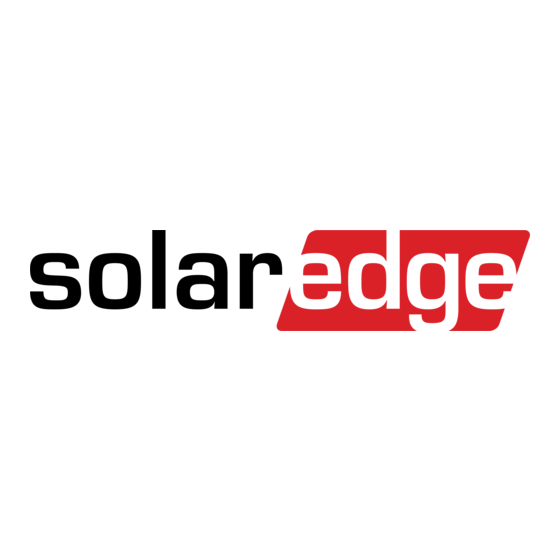

SolarEdge TerraMax Manual
Hide thumbs
Also See for TerraMax:
- Assembly replacement (6 pages) ,
- Replacement (4 pages) ,
- Quick installation manual (19 pages)
Summary of Contents for SolarEdge TerraMax
- Page 1 SolarEdge TerraMax™ Inverter communication options Installation Guide Version 1.0 SolarEdge Inverters Communication Options Installation Guide...
-
Page 2: Table Of Contents
The various types of communication options supported by the SolarEdge TerraMax Inverter are: Ethernet (built-in): Used for a LAN connection. Enables communication to the SolarEdge monitoring server. CAN bus (built-in): used for connecting TerraMax inverters on the same bus in a leader/follower configuration. RS485-1: this port supports the following functionality: Connecting to a third-party logger using the SunSpec protocol. -
Page 3: Communication Connectors
2.5-5 mm Figure 1: TerraMax Inverter communication glands The TerraMax inverter has a standard RJ45 terminal block for Ethernet connection, a 6-pin terminal block with three left pins for RS485-1 connections, and three right pins for CAN connections, and a connector for WiFi antenna. -
Page 4: Ethernet
Figure 4: Multiple device Ethernet connection Single inverter, wired Ethernet (LAN) connection Description In this configuration, Ethernet cables are used to connect the inverter to the SolarEdge monitoring server through an Ethernet router. Required equipment CAT5 or CAT6 Ethernet cable with RJ45 connectors. Maximum distance: 100m (330ft) per device connection. -
Page 5: Multiple Inverters, Can Bus, Wired Ethernet (Lan) Connection
Version 1.0, June 2024 LAN configuration SolarEdge inverters are pre-configured to use the LAN port by default, thus obtaining the IP settings automatically from a DHCP server. If a static IP is required, do the following in the SetApp Commissioning screen: 1. -
Page 6: Wi-Fi Connection
Protocol > SolarEdge leader LAN configuration (leader device) SolarEdge inverters are pre-configured to use the LAN port by default. They obtain the IP settings automatically from a DHCP server. If a static IP is needed, do the following: In the SetApp Commissioning screen: 1. -
Page 7: Required Equipment
The follower inverters are pre-configured to use the CAN port by default. To configure follower devices: 1. Go to the SetApp Commissioning screen. 2. Tap Site Communication > CAN > Protocol > SolarEdge follower To configure the CAN Leader device: 1. Go to the SetApp Commissioning screen. -
Page 8: Cellular Connectivity
To use the cellular communication option, the communication board must include a designated modem connector and its SolarEdge device CPU version must be 3.1600 or higher. To use a SolarEdge data plan, the SolarEdge device CPU version must be 3.1800 or higher. -
Page 9: Cellular Connection - Multiple Inverters
When completed, the cellular modem connects to the server and “Connected” appears in SetApp. For detailed communication configuration instructions see the Cellular Plug-in Installation Guide. For troubleshooting communication issues see the Cellular Plug-in Troubleshooting Guide. SolarEdge Inverters Communication Options Installation Guide... -
Page 10: Non-Solaredge Monitoring Connection Options
In this configuration you can connect multiple inverters on the same CAN bus in a leader/follower configuration. An Ethernet cable is used to connect the leader inverter to the SolarEdge monitoring server through an Ethernet router. The non-SolarEdge logger is connected to the RS485-1 port of the leader inverter. -
Page 11: Multiple Inverters, Wired Ethernet (Lan), Non-Se Logger (Modbus Over Tcp)
Inverter CAN Configuration For all follower inverters, in the SetApp Commissioning screen select: Site Communication > CAN > Protocol > SolarEdge Follower For the Leader inverter, in the SetApp Commissioning screen select: Site Communication > CAN > Protocol > SolarEdge Leader The leader must report the correct number of followers. - Page 12 LAN cable. LAN cables are used to connect the inverters to the SolarEdge monitoring platform via an Ethernet router. Inverter and Power Optimizer monitoring data is sent to the SolarEdge monitoring server via the LAN port using the SolarEdge protocol, and inverter monitoring data is sent to the non- SolarEdge logger via the LAN port using the SunSpec protocol.
-
Page 13: Multiple Inverters, Can-Bus, Wired Ethernet (Lan), Non-Se Logger
Figure 10: Multiple Inverters, CAN Bus, wired Ethernet (LAN), non-SE logger Description This configuration enables connecting multiple inverters on the same CAN bus in a leader/follower configuration to a non-SolarEdge logger via an Ethernet cable. Inverter monitoring data is sent to the non-SE logger using the SunSpec protocol. Required Equipment non-SE SunSpec logger CAT5 or CAT6 Ethernet cable with RJ45 connectors. - Page 14 If the blue LED is lit, communication with the server is verified. Inverter LAN configuration The SolarEdge devices are preconfigured to use the LAN port by default, thus obtaining the IP settings automatically from a DHCP server. If a static IP is required, select the following in the SetApp Commissioning screen: 5.
- Page 15 Version 1.5, June 2024 lf you have technical queries concerning our products, please contact our support through SolarEdge service portal: www.solaredge.com/service/support Australia (+61) 1800 465 567 APAC (Asia Pacific)(+972) 073 240 3118 Belgium (+32) 0800-76633 Netherlands (+31) 0800-7105 China (+86) 21 6212 5536 DACH &...












Need help?
Do you have a question about the TerraMax and is the answer not in the manual?
Questions and answers